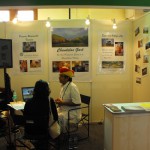Along with working for an NGO and managing a women’s empowerment crafts center for the past seven months, I have also learned quite a lot about tourism. Not only have I been living at a heritage hotel for this time, but I have also been helping manage the property and help in ways that have enabled me to become quite proficient in the Indian tourism industry.
As a conclusion for my learning process in tourism and my time here at the hotel, I helped my host father prepare and market the property at the Great Indian Travel Bazaar 2012. Being that my background is not in tourism, I had no idea what to expect nor did I expect the trade show to be that big of a deal. But oh was I wrong… After arriving in Jaipur, the capital of Rajasthan where the show was being held, we went to the auditorium where it was held and saw the monstrosities that other travel companies, hotel groups, and other tourism related business where building. And I am not putting “building” lightly because they actually had carpenters building their booths to resemble Indian architecture. Within ten minutes of arriving, I was already feeling like I should have been more informed and ready for this show that was going to be quite an ordeal.
Since I had no idea what I was doing, the only things I did to prepare for the trade show were print some posters that I designed and made sure everything made it to Jaipur, including Praduman (my host father) and myself. After walking in and seeing the other booths, I was starting to get worried, but it all worked out, and after all, most of the others are large companies and Chandelao Garh (Praduman’s hotel) is a small family run heritage hotel.
Other than the fact that I did almost all the marketing at the show, while Praduman and his son walked around and talked with their fellow Rajput friends, I learned more about the society that I have been living in for the past seven months. My host family, along with the majority of Indians I know, are Rajputs, the warrior caste. I have noticed some camaraderie between the Rajput men and families that I encounter, but the trade show shone a whole new light on the degree of connection that the Rajput society holds to one another. As I walked around the trade show and the events that coincided, Praduman and Veer, his son, were constantly finding someone they knew. At first, I was confused, but then it dawned on me why they knew everyone. The Rajputs were at one time the ruling caste of India and they continue to hold on to the palaces and forts that have been converted into heritage hotels and other tourist destinations. It all started to come together after that, and what a Rajput-fest the trade show ended up being. I can’t recall how many people I was introduced to with the last name Singh or Rathore (the prominent Rajput surnames).
On the first day, the realization came to me about the Rajput society being so tight knit due to them all being the landowners from before India gained Independence. This happened as Praduman and myself were invited to lunch at the Ashok Club which was a colonial style gentlemen’s club close to the auditorium where the trade show was being held. Well, if it was awkward enough being the only female and the only white person in the entire establishment, no one would even bother talking to me. That is the problem with Rajput men, once they get around each other, women are forgotten about and it’s all about the men. In their society, the men and women are separated in many situations and carry on the strictest gender separating traditions here in India. While the Rajputs tend to be the most educated because of being the wealthiest not too long ago, they also tend to be the most chauvinistic.
Even though I have gotten used to being ignored around Indian men, because I am put in the situation quite often at the hotel, it still annoys me very much. However, I have been able to see a part of society that women in India are not generally privy to such as the men’s club, socialization between men, and being allowed to drink alcohol if I want. I call this the “Golden Ticket.” It has gotten the gals and myself quite a few things that are not common for Indian women to receive. It is a curse and a blessing. Sometimes it is good because the people around you accept you and allow you to see a part of society that Indian women are not allowed to be involved in, while other times it is a burden because people can be quite demanding of fair-skinned foreigners and treat them badly because they are assumed to be tourists.
Anyways, back to the GITB travel show. I believe we were able to market the hotel quite well and there were many foreign “buyers” that seemed very interested in using Chandelao Garh as a property for their tours and travelers. Even though our booth seemed to be the most modest of those around us, many people still made it a point to contact the hotel in the past week. I suppose my marketing skills are better than my decorating skills. I have learned that at least.
My last thought on the matter though was that there was so much paper being wasted. I don’t understand why people (mainly Indians) had to go around and literally take every single brochure and business card off of every table. I assume the foreigners were not taking as much because they all had to travel afterward. But come on, doesn’t anyone see the amount of trash around the country right now and realize that they are just going to end up throwing away all of those brochures? It was just very, very frustrating. It is going to take a long time and a lot of education for people in developing and underdeveloped countries to understand how to cut down on trash and for their governments to take the initiative to establish ways of cutting it down. After all, the U.S. and Europe are just now realizing the need for these movements.


